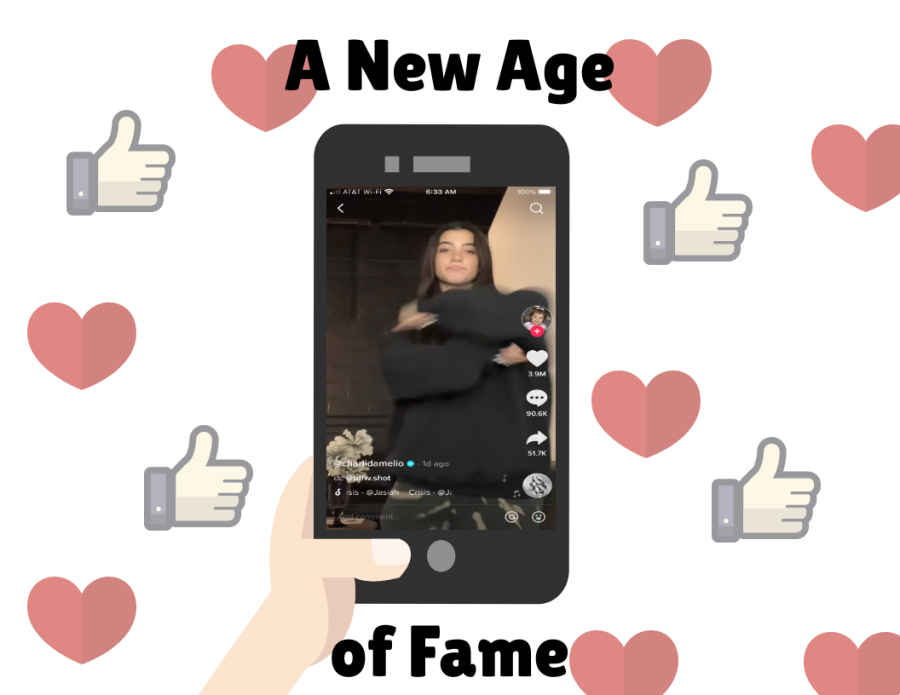A New Age of Fame
Tiktok creates a platform for too many people to get their 15 seconds of fame, which leads to an oversaturation of small “stars.”
Tiktok stars can now rise to fame more quickly than any social media star in the past.
Since the early 2000s, social media continues to rise as the world’s most powerful and influential form of persuasive media. This has led to the rise of the “influencer,” defined as “a person who has the power to influence many people, as through social media or traditional media,” (dictionary.com). According to dictionary.com, this definition was not added to the site until 2016, when the rise of YouTube and Instagram influencers caused a spike in the number of searches for the word.
In the mid-20th century, movie stars and professional athletes were accused of gaining fame without reason, and even more recently, reality TV stars such as the Kardashians received criticism for rising to fame without any apparent talents. But the rise of these social media influencers leads to an entirely new era of celebrity culture, and especially in the new world of TikTok, the influencer lifestyle is becoming more and more enticing for impressionable teens.
TikTok, as a platform, makes gaining fame easier than ever. In an article by the New York Times, it’s stated that “[TikTok] succeeded [were] other short videos apps failed in part because it makes creation so easy, giving users background music to dance to or memes to enact, rather than forcing them to fill dead air” (New York Times).
Users of TikTok need not even possess a talent in order to rise to fame—merely dancing to a trending song can allow an average teen to gain thousands of likes and followers. A study done by Vox states that “TikTok has created a celebrity manufacturing machine that operates faster and more powerfully than any social media platform that has come before it, turning average teenagers into international stars in a matter of weeks, sometimes days.”
And now, companies and even awards shows are catching on to how lucrative it can be to recruit these influencers, who have a following consisting mostly of teens, to advertise their products. Their followers are compelled to use a product or watch a show after seeing their favorite TikTok start participating. A recent, prevalent example of this is the recent 2022 Oscars ceremony, where many TikTok celebrities were invited to boost publicity for the show after low ratings in the previous year. At this Academy Awards show, young viewers were shocked and excited that their favorite TikTok influencers—such as Charli D’Amelio, Addison Rae, Remi Bader, Tinx, and Anna Sitar—were present, giving TikTok glimpses of their designer outfits and the highly-coveted after-party by both postings from their own accounts and taking over other social media accounts such as that of Vanity Fair.
This has caused some controversy because, in the past, the Oscars have been a highly exclusive event with only Hollywood’s brightest stars receiving an invite. Now, with social media influencers easily obtaining invitations to these shows, it feels to some as though anyone can walk the red carpet if they get enough followers. And when considering TikTok’s curated algorithm, the app’s programming makes it exponentially easier for creators to reach followers who enjoy their specific content. TikTok’s algorithm is “a prediction driven by machine-learning and actual user behavior [using] three bits of data: likes, comments, and playtime, as well as an indication that the video has been played,” (New York Times). With help from the algorithm, anyone can reach users who find their content interesting mere seconds after they click “post.”
Even with only 5.25% of TikTok’s 1 billion users possessing 100,000 to 500,000 followers (Statista), that statistic still means that 525 million creators possess hundreds of thousands of followers, which elevates them to what can be considered by many as “influencer status.”
When well over 500 million people have received their 15 seconds of fame, one might ask what that is doing to society’s perception of a celebrity. If average people can gain a following for simply creating a quick video and letting the app’s algorithm take it from there, that leads many to ask if it even means anything to be “famous” anymore.
While there are some social media influencers that have become something closer to household names, such as YouTube-born influencers like Emma Chamberlain (who was also present at this year’s Academy Awards), Mr. Beast, and PewDiePie, the world of TikTok opens up a whole new arena of stardom. While YouTube has been popular in the past, TikTok presents the opportunity to mindlessly scroll through a never-ending stream of videos, leaving ample opportunity for as many people as possible to gain thousands of views in a matter of minutes. The average person now has an equal opportunity with someone who possesses the immense talent to become an “influencer.” Anyone who is pretty, funny, charismatic, or even weird can capitalize on fame by riding the wave of the TikTok algorithm.




